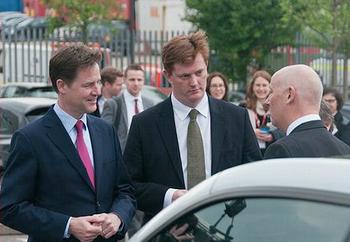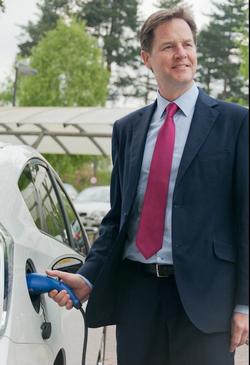
LONDON, UK, May 1, 2014 (ENS) – The UK government will spend £500 million (US$844.7 million) to boost the ultra low emission vehicle industry and help drivers both afford and feel confident using electric cars, Deputy Prime Minister Nick Clegg announced Tuesday.
To encourage more people to drive ultra low emission vehicles, the present grant program that offers £5,000 (US$8,446) off the upfront cost of these vehicles will be extended with funding of an additional £200 million (US$337.8 million).

The automotive sector is a success story of the UK’s economic recovery, with a new vehicle rolling off a UK production line every 20 seconds and the industry is worth £11.2 billion (US$18.9 billion) to the economy, said Clegg. “The production of ultra low emissions vehicles, or ULEVs, is a major part of growth both now and for the future.”
The investment of £500 million between 2015 and 2020 will create jobs, reduce emissions and set the agenda for the industry, for our towns and cities, and for motorists, so that Britain remains at the forefront of green technology, he said.
Local areas that come up with the most ambitious plans can win up to £35 million (US$59 million) to make the leap to ultra low emission status.
Winning cities could, for example, incentivize drivers of green cars by letting them use bus lanes or allowing them to park for free.
Clegg announced that additional funding of £50 million(US$8.44 million) will be available for local areas to invest in cleaner taxis and buses.
“We will invest £100 million in research and development in ULEV to cement the UK’s position as a leader in the development of these technologies,” said Clegg.
“The UK’s automotive industry has undergone a renaissance in recent years and we have the potential to emerge as a world leader in the development, design and manufacture of green vehicles,” he said. “This investment will help create skilled British jobs and have further positive impact down the supply chain.”
An investment of £32 million (US$54 million) will fund charging infrastructure, including the installation of rapid chargepoints across the ‘M’ and ‘A’ road network by 2020 so that drivers can find a rapid chargepoint when they need one. Cars using rapid chargepoints can charge their batteries in as little as 20 minutes.
Government plans call for a rapid chargepoint at every motorway service station by the end of this year, and a network of 500 rapid chargers across the country by March 2015 – the best network in Europe.
The scheme includes £30 million (US$50 million) for low emission buses.

During a visit to the Transport Research Laboratory in Wokingham with Chief Secretary to the Treasury Danny Alexander to see how green cars are tested and speak to industry leaders, Clegg said, “Owning an electric car is no longer a dream or an inconvenience. Manufacturers are turning to this new technology to help motorists make their everyday journeys green and clean.”
“This major investment is there to make driving an electric car affordable, convenient, and free from anxiety about the battery running out,” Clegg said. “But it’s also about creating a culture change in our towns and cities so that driving a greener vehicle is a no-brainer for most drivers.”
Drivers pay no road tax or congestion charge on ULEVs. The average journey made by motorists is just seven miles, with the typical range of a battery-electric car being around 100 miles.
Alexander said, “Ultra low emission vehicles bring together our most successful manufacturing sectors with our biggest long-term challenge – climate change. Britain can be the leading country in the world in developing, manufacturing and using ULEVs. This half billion pound government investment will help to ensure we rise to the challenge.”
To help interested drivers to find out more about what ULEVs could offer them, Clegg launched the Go Ultra Low campaign in January. Backed by five major automakers, Go Ultra Low provides clear answers about these vehicles and how to use and charge them.
In 2013, the British government announced it would consult with industry, academics and other experts on how £500 million might be put to best use in helping this rapidly developing market pick up pace. Tuesday’s announcement is the result of that consultation.
Alexander said the government is also working on other elements of support, including the support for hydrogen fuel cell vehicles.
Full details of the ULEV plan will be published by autumn 2014. Some of the funding opportunities will begin accepting applications shortly thereafter.
Copyright Environment News Service (ENS) 2014. All rights reserved.
